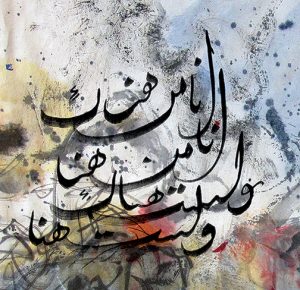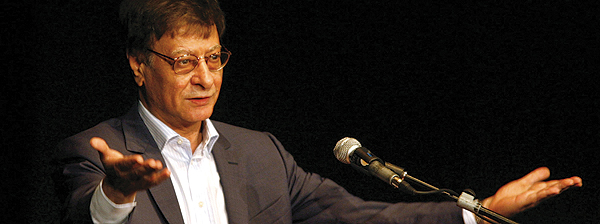By: Lisa Suhair Majaj
This Week in Palestine normally chooses a living person as the Personality of the Month, but we feel strongly that an exception must be made here to feature the late Mahmoud Darwish. Beloved as a national symbol, a poet who, as Mahmoud Darwish Museum architect Shadi Abdulsalam puts it, “brilliantly transformed a nation’s cause into a symbol of universal struggle,” Darwish speaks across time and geography to the experiences and longings of Palestinians – and also to readers worldwide.
Born on March 13, 1941 in Al Birweh, Palestine, Darwish experienced the Nakba of 1948 at a young age. His family fled to Lebanon, but later managed to slip secretly back across the border. There they found their village razed by the Israeli army to prevent the return of inhabitants. Because they had not been present when Israel registered the Palestinian population, they were not only refugees in their own land but also, in official parlance, “present absentees.”
This oxymoronic status haunts Darwish’s writing as both fact and symbol. What does it mean to be present, standing before an authority that controls your fate, yet told you are absent? To be erased by history but still there? To be in and of a homeland, yet forbidden presence? To bear the weight of a lost past, exist in a present always under erasure, and make your way toward an uncertain future holding both the dream of wholeness and the nightmare of reality? What voice, what language could transcribe such a radical schism?
 The resonance of such questions provides a thread that weaves through Darwish’s literary oeuvre. From the clarion call of his early work (exemplified in “Identity Card” with its famous “Write down!/I am an Arab”) to the elegiac indirection of his later volumes (language that Fady Joudah describes as “elusive abandon”), Darwish navigates pathways between exile and belonging that are both actual and metaphorical. Pondering questions of identity and memory, mortality and myth-making, he carves out a space within the workings of power for the power of the word. As he writes, “We will tell our story in our own words, we will transcribe our historical plot and relationship with the place, we shall inscribe the memory of place, and the place of memory.” His words speak across human borders with the power of simplicity, as in his lines, “I was born just like you/I have a mother/and a house with many windows./I have brothers, friends/and a prison with one cold window.” And they travel into deeply complex philosophical spaces, exploring relationships between self and other, self and self.
The resonance of such questions provides a thread that weaves through Darwish’s literary oeuvre. From the clarion call of his early work (exemplified in “Identity Card” with its famous “Write down!/I am an Arab”) to the elegiac indirection of his later volumes (language that Fady Joudah describes as “elusive abandon”), Darwish navigates pathways between exile and belonging that are both actual and metaphorical. Pondering questions of identity and memory, mortality and myth-making, he carves out a space within the workings of power for the power of the word. As he writes, “We will tell our story in our own words, we will transcribe our historical plot and relationship with the place, we shall inscribe the memory of place, and the place of memory.” His words speak across human borders with the power of simplicity, as in his lines, “I was born just like you/I have a mother/and a house with many windows./I have brothers, friends/and a prison with one cold window.” And they travel into deeply complex philosophical spaces, exploring relationships between self and other, self and self.
After publishing his first book at the age of 22, Darwish went on to author over 30 books of poetry and 8 of prose, edit the literary journal Al-Karmel, and receive a host of prestigious prizes, including the Lannan Cultural Freedom Prize, the Lenin Peace Prize, and the French Knight of Arts and Belles Lettres Medal. Although he resisted the overdetermination of his role as national symbol, in his work the personal, the political, and the philosophical are deeply intertwined. “Sometimes they arrest you while you are committing a dream,” he writes. One might say that his life was marked by the commission of many dreams.
When I asked people to share favorite lines and thoughts about Darwish’s impact on them, I received comments from around the world. From Rajesh Umadvi Srinivas in India: “Greetings to the one who shares with me an attention to/The drunkenness of light, the light of the butterfly, in the/Blackness of this tunnel!” Arab-American writer Kathryn Haddad mentioned the line, “Our job is not to be writing poems, our job is to be fighting,” noting that it had always haunted her as a writer. Laleh Khalili wrote from London: “When I was writing my book on the ways in which Palestinians have commemorated their pasts, Darwish’s poetry, but most importantly his Memory for Forgetfulness, was my guide. […] the very arc of his own poetic development over time for me echoed the kinds of transformations in the way Palestinians chose to tell the memories of their past.” Washington, D.C. statistician Aref Dajani observed, “As a singer/songwriter, Darwish has absolutely influenced me. Instead of trying to make sense of what I am writing, I just write, even if the words appear conflicting or contradictory.” From Hawaii, Adele Ne Jame shared her Darwish-inspired poem, “A Chouf Lament.” Palestinian author Liana Badr wrote, “He was the teacher and the deep eye to let us know how to look into the beauty of Palestine. […] He turned the slogans about homeland to a deep experience [of] looking inside our culture and its relationship with humanity.” And Kefa Abukhdeir, writing from Jerusalem, replied simply, “His pen released us from history and gave us a future.”


